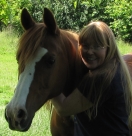Eco-Horsekeeping; Over 100 Budget-Friendly Ways You and Your Horse Can Save The Planet by Lucinda Dyer (ISBN 978-1-57076-416-5). In this book you will find an abundance of ideas and resources for a greener barn, horse and rider! The book itself contains lots of detail, and the comprehensive contact lists for organizations and websites will lead you directly or indirectly to almost any information you will need in your journey to become more environmentally aware and friendly. She also has a section about foster care and adoption of horses, which falls into the social category of sustainability. Please look for this book through your local, independent book store, or visit www.horseandriderbooks.com .
The Ecology of Commerce by Paul Hawken (ISBN-13: 978-0-887-30704-1 and ISBN-10: 0-887-30704-3). The subtitle is “A Declaration of Sustainability” and this book is a comprehensive yet concise declaration. For me, the early chapters served as a wake-up call, reminding me, in no uncertain terms, just how critical our environmental situation really has become. Hawken then took me from this hopeless feeling to possibilities for change within the business and social realms. He expounds on the following eight objectives: 1] Reduce absolute consumption of energy and natural resources in the North by 80% within the next half century. 2] Provide secure, stable, and meaningful employment for people everywhere. 3] Be self-actuating as opposed to regulated or morally mandated. 4] Honor market principles. 5] Be more rewarding than our present way of life. 6] Exceed sustainability by restoring degraded habitats and ecosystems to their fullest biological capacity. 7] Rely on current income. 8] Be fun and engaging, and strive for an aesthetic outcome. I encourage you, especially if you are a business owner, to explore these objectives in more detail. And the sooner the better!
Natural Capitalism by Paul Hawken, Amory Lovins and L. Hunter Lovins (ISBN 0-316-35300-0). A follow up to The Ecology of Commerce, this incredible guidebook “introduces an alternative [to the Industrial Revolution], a new paradigm. Praised by business and political leaders as well as economists and environmentalists around the globe, this groundbreaking book reveals how tomorrow’s most successful global businesses will draw profit from their own environmental responsibility.” I have taken lots of notes while reading this book – and plan to read it again!
Cradle to Cradle, Remaking the Way We Make Things by William McDonough and Michael Braungart (ISBN-13: 978-0-86547-587-8 and ISBN-10: 0-86547-587-3). What do you get when you pair an architect with a chemist? A ‘new’ concept: Waste equals food. This simple concept takes our thinking from our current, linear “cradle to grave” mode, to a cyclical “cradle to cradle” mode! Products are made and remade in continual, closed system loops, consisting of either “biological nutrients” or “technical nutrients”. If nature can do it this way, why can’t we? No matter who you are, you will gain a great deal from reading this book. Warning: you will also find or expand your creative abilities!
